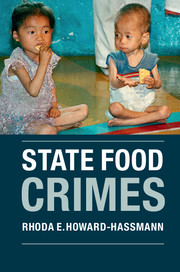Book contents
- Frontmatter
- Dedication
- Contents
- Acknowledgments
- Part I Introduction and Background
- Part II Contemporary Case Studies
- Part III Implications for the International Human Right to Food
- 8 International Law and the Right to Food
- 9 Sticks and Carrots: Sanctions and Food Aid
- 10 Interdependent Human Rights
- 11 Liberal Democracies and the Right to Food
- 12 A New International Treaty on the Right to Food
- Bibliography
- Index
10 - Interdependent Human Rights
from Part III - Implications for the International Human Right to Food
Published online by Cambridge University Press: 05 August 2016
- Frontmatter
- Dedication
- Contents
- Acknowledgments
- Part I Introduction and Background
- Part II Contemporary Case Studies
- Part III Implications for the International Human Right to Food
- 8 International Law and the Right to Food
- 9 Sticks and Carrots: Sanctions and Food Aid
- 10 Interdependent Human Rights
- 11 Liberal Democracies and the Right to Food
- 12 A New International Treaty on the Right to Food
- Bibliography
- Index
Summary
In Chapter 3, I discussed Sen's argument that there are no famines in functioning multiparty democracies. Sen argues for the importance of civil and political rights to prevent famine but focuses his argument on freedom of the press, freedom for opposition political parties to function, and the ability of citizens to vote their governments out of power (Sen 1999, 178–82). While I agree with Sen's stress on these important rights, the cases I selected for this volume show the equal importance of other civil and political rights, including the rule of law, the right to citizenship, and mobility rights. Both property rights and the right to work, which might be viewed more as economic than civil and political rights, are also key to protection of the right to food. Thus, Sen's initial thesis must be expanded to take a careful look at the entire gamut of human rights and their effect on individuals’ right to food. Human rights are interdependent.
Civil and Political Rights
The victims of state-induced famines in Ukraine, China, and Cambodia were ruled by totalitarian governments that denied them all civil and political rights. Neither in those countries was there any semblance of the rule of law. Nineteenth-century Irish peasants were colonial subjects of Britain, without the rights that Sen finds so crucial. While they may have had some right to criticize Britain and to protest the government's actions through a (quasi) free press, they could not vote their government out of power: In Ireland only landlords and the middle classes were represented in the British Parliament. Aboriginals starving in the Canadian West in the 1870s did not possess even these minimal rights to criticize their rulers, nor did they have access to the courts to protect them against deprivation of their land, property, and food. Indeed, well into the twentieth century Aboriginals living on reserves were prohibited from voting and from organizing in defense of their own interests. And Germans after the November 1918 Armistice were officially enemies of the government that starved them, without any capacity to influence its policies except through their diplomats.
- Type
- Chapter
- Information
- State Food Crimes , pp. 180 - 196Publisher: Cambridge University PressPrint publication year: 2016



